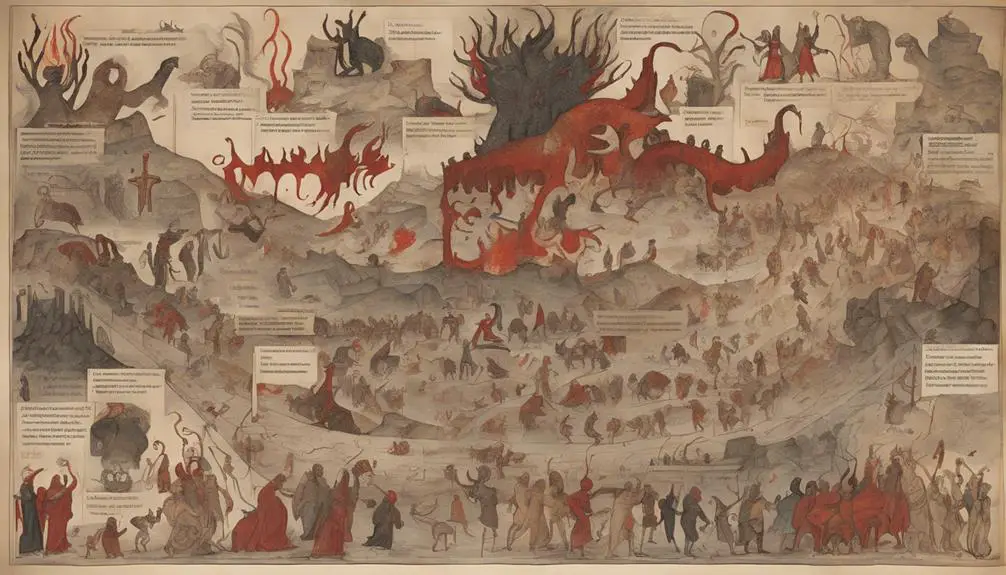Ponder the complexities of using 'hell' in conversation and its moral implications, delving into cultural and religious contexts that shape our understanding.

Is Hell a Sin to Say?
Have you ever wondered if saying 'hell' is a sin? You're not alone in pondering the morality behind language use, especially when it comes to words with deep-rooted theological implications.
As you navigate through the origins, evolution, and current interpretations of 'hell,' you'll find that cultural and religious perspectives play a significant role in whether this term is considered taboo or merely a part of everyday vernacular.
The journey ahead promises to uncover intriguing insights and perhaps challenge your current stance on the matter, leaving you to question the very nature of sin and language.
Key Takeaways
- The sinfulness of saying 'Hell' varies with conservative, moderate, and liberal theological perspectives.
- Context and intent are crucial in assessing whether using 'Hell' is considered sinful.
- Cultural and regional differences significantly influence the acceptability of uttering 'Hell.'
- Ethical language use involves situational awareness and respect for diverse beliefs regarding 'Hell.'
Understanding 'Hell': Origins and Evolution

To fully grasp the concept of 'Hell,' it's essential to trace its origins and evolutionary trajectory across various cultures and religious texts. Hell's etymology reveals a fascinating journey through languages and beliefs, highlighting how interpretations of the afterlife have been shaped by linguistic shifts and cultural exchanges. The word 'Hell' itself has roots in Old English 'hel' or 'helle,' referring to the netherworld of the dead in Norse mythology. This term underwent significant transformation as it was assimilated into Christian theology, where it came to denote a place of punishment for the wicked after death.
Linguistic shifts played a pivotal role in Hell's conceptual evolution. As languages and cultures mingled, the notion of Hell expanded, incorporating features from Greek, Roman, and other ancient mythologies. These shifts in language mirrored broader changes in religious and philosophical thought, influencing how Hell was perceived and described. The fluidity of Hell's definition, as seen through its linguistic journey, underscores the complexity of its role in human culture and belief systems, far beyond a mere word or place. It's a testament to the power of language to shape, and reshape, our understanding of the cosmos and our place within it.
Theological Perspectives on Saying 'Hell
Theological perspectives vary widely on whether uttering the word 'Hell' is considered sinful or merely descriptive of a doctrinal concept. This divergence stems largely from Hell's etymology and the Scriptural debates surrounding its interpretation. Delving into these theological viewpoints, you'll find that interpretations are deeply influenced by linguistic, historical, and doctrinal examinations.
Perspective |
Basis |
Interpretation |
|---|---|---|
Conservative |
Scriptural literalism |
Uttering 'Hell' outside of doctrinal discussion is often viewed as sinful due to the word's solemnity and sacred context. |
Moderate |
Contextual analysis |
The sinfulness of saying 'Hell' depends on intent and context, not the mere act of uttering the word. |
Liberal |
Sociolinguistic |
Focuses less on the word itself and more on the speaker's attitude and purpose, seeing no inherent sin in its usage. |
Academic |
Hell's etymology |
Emphasizes understanding the evolution of the word and its original meanings, advocating for informed, respectful usage. |
This table summarizes the nuanced views across the spectrum, highlighting how interpretations of 'Hell' and its appropriateness in speech are far from unanimous. Scriptural debates add layers of complexity, with each group drawing on different textual analyses to support their stance.
Cultural Variations in Acceptance

While exploring the theological nuances of saying 'Hell' reveals a spectrum of perspectives, examining cultural differences offers further insight into its global acceptance and usage. You'll find that regional taboos play a significant role in shaping the linguistic sensitivity surrounding this term. In some cultures, 'Hell' isn't merely a religious concept but intertwines with local superstitions and beliefs, making its casual use more contentious.
In communities with a strong religious adherence, saying 'Hell' outside of a strictly theological context can be frowned upon, reflecting a deep-seated reverence for spiritual matters. Conversely, in societies where secularism or a variety of religious beliefs coexist, the term may lose some of its potency, becoming part of everyday language with little to no spiritual weight.
Moreover, the concept of 'Hell' and its linguistic counterparts vary significantly across languages, further complicating its global perception. What's considered taboo in one language might be perfectly acceptable in another, highlighting the importance of understanding local customs and sensitivities. This linguistic sensitivity underscores the need to navigate conversations about 'Hell' with care, especially in multicultural or international settings, ensuring respect for diverse beliefs and practices.
Hell in Everyday Language: Impact and Interpretations
Incorporating 'Hell' into everyday language significantly shapes its impact and interpretations across various social contexts. When you use 'Hell' in your speech, it's not just a word; it becomes a reflection of societal norms and personal emotions. Here's how:
- Swear Replacement: 'Hell' often serves as a less offensive substitute for stronger swear words. This usage reflects societal efforts to moderate language while still expressing strong emotions.
- Emotional Expression: The term is a powerful tool for conveying frustration, surprise, or disbelief. It amplifies your emotional state, providing a vent for feelings that might be hard to express otherwise.
- Cultural Acceptance: Depending on the context, 'Hell' can be a casual expression or a taboo. Its acceptance varies widely, influenced by cultural norms and personal beliefs about propriety and language.
- Language Evolution: The use of 'Hell' in everyday language demonstrates the fluidity of language. Words evolve, gaining new meanings and losing old ones based on collective usage and societal shifts.
Understanding the role 'Hell' plays in communication requires recognizing its dual function as both a swear replacement and a means of emotional expression. This dual role enriches its impact, making it a fascinating study in the dynamics of language.
Navigating the Morality of Language Use

Assessing the moral implications of using specific language, particularly words like 'Hell', requires a nuanced understanding of societal values and personal beliefs. The field of speech ethics provides a framework for examining the appropriateness of language in various contexts, emphasizing the responsibility of speakers to consider the impact of their words. Language pragmatics, the study of how context influences the interpretation of language, further complicates this assessment by highlighting how the same word can convey different meanings in different settings.
You're tasked with navigating these complex considerations whenever you communicate. It's not just about what you say but how, where, and to whom you say it. The use of 'Hell' might be innocuous in casual conversation among friends but could be deemed inappropriate or even offensive in more formal or religious contexts. This distinction underlines the importance of situational awareness and adaptability in ethical communication.
Ultimately, determining whether it's a sin or morally wrong to say 'Hell' isn't a one-size-fits-all answer. It hinges on your ability to critically assess the context of your speech, the potential impact on your audience, and the alignment of your language with your personal and communal values.
Frequently Asked Questions
How Does the Use of the Word 'Hell' in Digital Communication Platforms (E.G., Social Media, Texting) Affect Its Perception and Acceptability?
Using 'hell' on platforms like social media reflects language evolution and cultural shifts. It's become more acceptable, showing how digital spaces can influence perceptions. You're witnessing a transformation in what's considered appropriate in our language.
Are There Psychological Implications for Individuals Who Frequently Use Religious Swear Words Like 'Hell' in Their Everyday Language?
Using religious swear words like 'hell' regularly can impact your emotional state, reflecting language evolution's influence. It's crucial to understand this behavior's psychological implications, as it shapes personal and societal language acceptability norms.
How Do Non-Abrahamic Religions and Cultures Perceive the Concept and the Usage of the Word 'Hell' in Colloquial Speech?
In exploring how non-Abrahamic religions perceive 'hell', you'll delve into cultural interpretations and linguistic evolution. Analyzing this topic reveals diverse beliefs and the word's varied significance across cultures in colloquial speech.
What Role Does Age or Generational Differences Play in the Perception of 'Hell' as an Acceptable Term in Casual Conversation?
You'll find that age and generational differences greatly influence the acceptance of "hell" in casual conversation, with language evolution and cultural sensitivity playing key roles in shaping perceptions across different age groups.
Can the Frequent Use of the Word 'Hell' in Media (Films, TV Shows, Books) Desensitize People to Its Religious or Offensive Connotations?
Yes, the frequent use of "hell" in media can desensitize you to its religious or offensive connotations, contributing to linguistic evolution and affecting cultural sensitivity. It's crucial to understand the impact of media on language perception.
Conclusion
In analyzing the concept of saying 'hell,' it's clear that societal, cultural, and theological contexts greatly influence its perceived morality. While some view it as a benign expression, others see it as laden with religious weight.
Your understanding of 'hell' in language hinges on these multifaceted perspectives. Thus, navigating its use demands sensitivity to its diverse implications and a thoughtful consideration of the audience.
Ultimately, the morality of saying 'hell' isn't universal but deeply personal and context-dependent.



Sign up